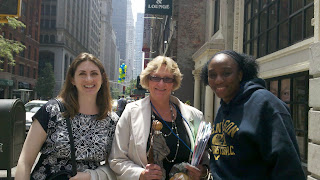Well, I met fellow writer Jessica Vealitzek a few weeks ago, and heard she was attending the Backspace Conference in NYC–something I’d failed to pull the trigger on. I asked her if she wouldn’t mind giving us some insight into how she picked the conference, and what it was like to attend. Without further ado, here’s Jessica!
I attended my first conference last week and lucked out. Backspace provided exactly what I was looking for–a welcoming “formal” entrance into the (physical) literary world.
Last January as I was writing my first novel, The Rooms are Filled, I wanted to have something to aim for. Backspace not only provided a deadline, it offered a place to meet other writers, agents, and authors, and, in a sense, celebrate the completion of my novel.
 |
| Jessica and writer Regina Swint |
I’d never heard of Backspace until a fellow writer mentioned she was going. I researched it and other conferences online and this is what sold me: rather than speed-dating agents in 1-minute pitch sessions that, I gather, agents hate as much as authors, Backspace provides a workshop setting. You bring your query letter and the first two pages of your manuscript, read them aloud to a small group of writers and two agents, and listen to the agents critique it. The hope is that one–or heck, both–of the agents will ask to read more of your manuscript. But even if that doesn’t happen, the workshop gives you the chance to start a relationship with agents interested in your genre. Plus, wouldn’t you rather have an agent read your actual writing than try to sell it orally in an elevator pitch?
As an MFAer, I’m familiar and comfortable with workshops. If you’re not, don’t be afraid. The criticism is never or never should be, offered harshly. You also get to hear the critiques of others’ writing, giving you a whole picture of what those particular agents look for when they read submissions.
Beyond the agent workshops, there were panel discussions led by agents and published authors on the craft and industry of writing, such as, “What Literary Agents Want,” “Self-Publishing vs. Traditional Publishing,” and “Developing Characters Readers Care About.” Writers also had the option of adding, for an additional cost, a one-on-one session with an agent for ten minutes (and ten pages).
On Saturday, the third and final day, I attended the afternoon group workshop with agent Donald Maass, who is a recurring participant. The four hours flew by faster than any MFA class I ever had and included an incredible amount of smart “Shoot, why didn’t I think of that?” advice.
 |
| On the street in NYC |
Backspace, as I understand it, is more expensive than most conferences ($500-600). On top of that, the hotel is in the middle of Manhattan )better access to and for agents), which means just about everything else is expensive. Backspace organizers do a good job of providing as much info as possible on cheap alternatives and they will also pair people who want a roommate.
I suppose a literary conference in New York could have been intimidating, filled with snobby literati (dressed all in black, of course, and carrying their own copy of Ulysses). But from the authors to the organizers to the agents, the people were friendly and laid-back, helpful and interested.
 |
| Writers Kathryn Maughan, Mary Kay Jennings, and Regina Swint |
Which leads me to what turned out to be one of the best parts: meeting other writers. the atmosphere was supportive, not competitive. I received encouragement that I will forever be grateful for, and I found an online critique partner. I left the conference not overwhelmed, but inspired. Which, as eery writer knows, is worth gold.
Read Jessica’s fascinating series, Monday Morning Meetings, on her website, True Stories.







